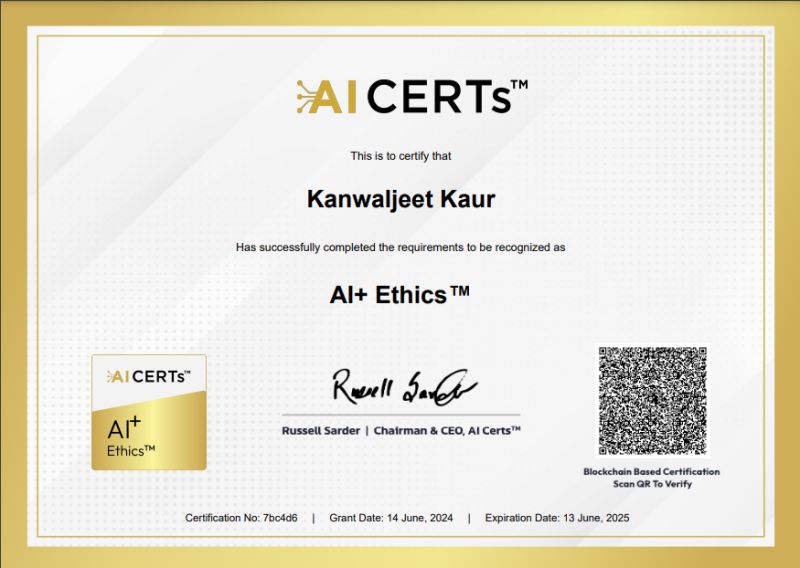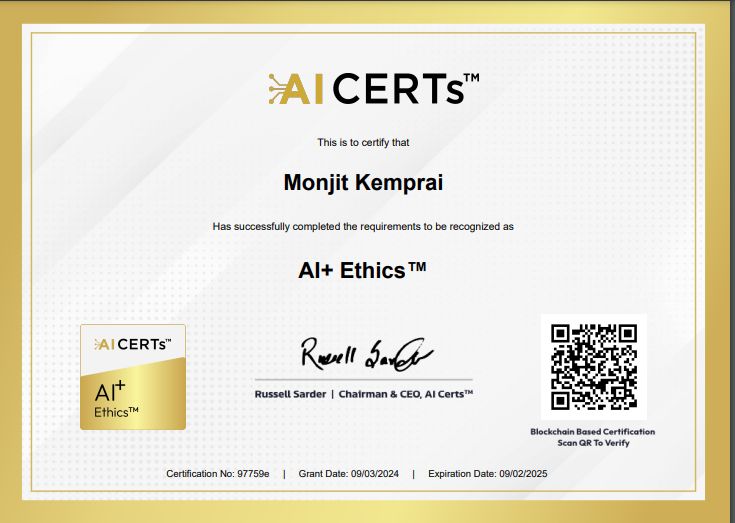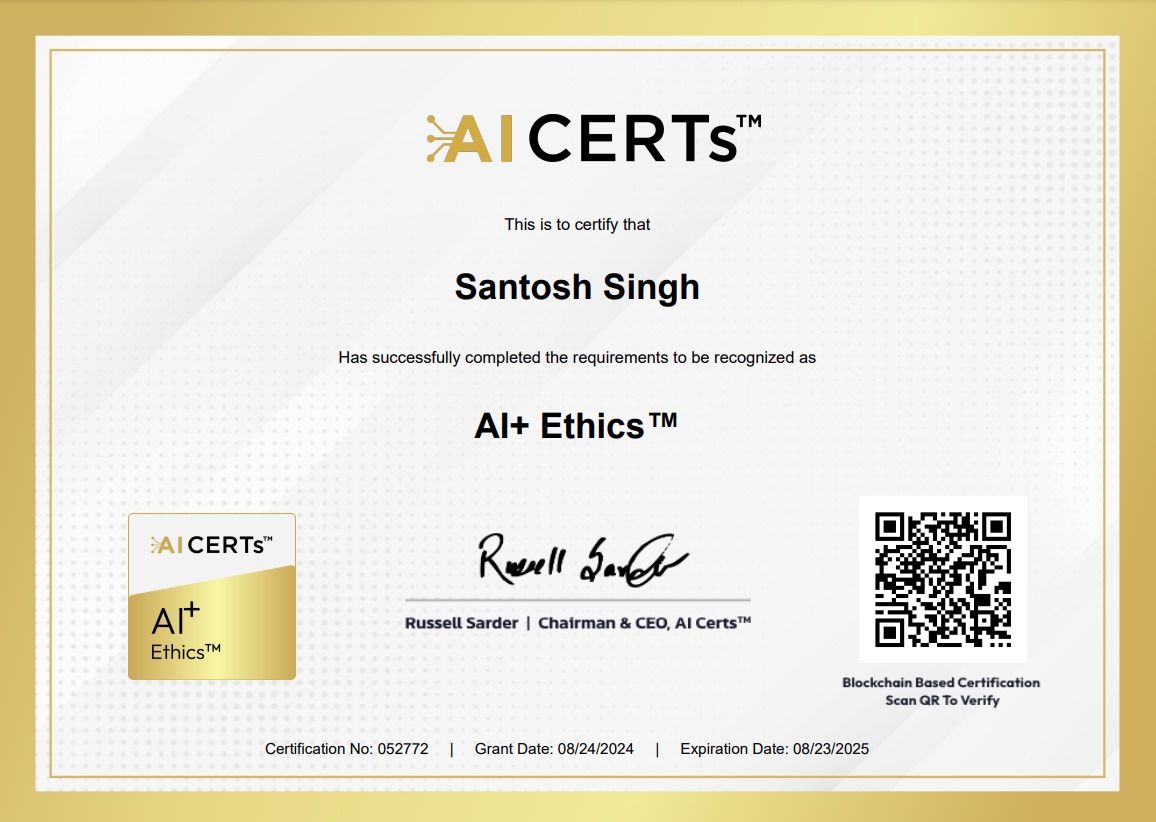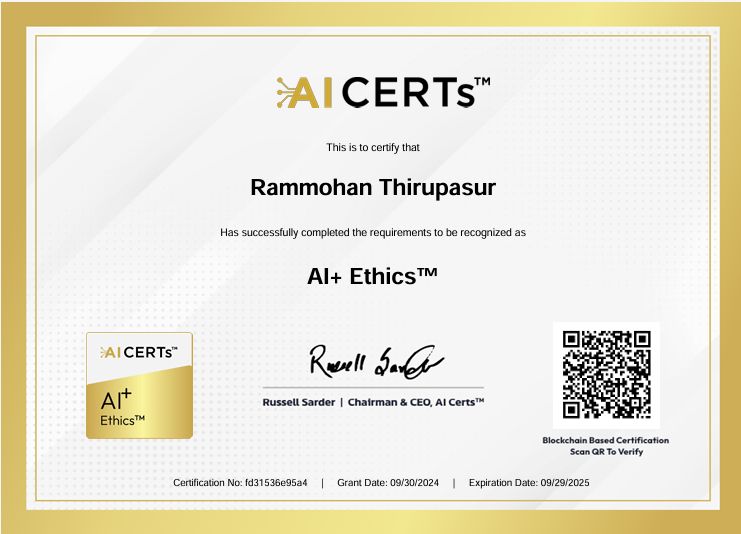AI+ Ethics™
AC-120
Navigate the Intersection of AI and Ethics in Business Landscape- Responsible AI Focus: Master ethical AI use aligned with business and societal values
- Risk Mitigation: Learn to manage compliance, transparency, and AI decision-making
- Strategic Guidance: Integrate ethical practices into AI adoption and leadership
- Reputation Builder: Build organisational trust and credibility in AI deployments
Why AI Ethics™? 10X AI Governance & Compliance Impact
At a Glance: Course + Exam Overview
- Instructor-Led: 1 day (live or virtual)
- Self-Paced: 6 hours of content

Who Should Enroll?
Ethics Professionals:Enhance your expertise in AI ethics to guide responsible AI deployment.
AI & Data Enthusiasts:Learn how to apply ethical frameworks in AI decision-making processes.
Compliance Officers:Ensure AI technologies comply with legal and ethical standards to mitigate risks.
Technology Leaders:Drive ethical AI strategies and lead responsible AI initiatives within organizations.
Students & New Graduates:Gain a competitive edge in the rapidly growing field of AI ethics.
Industry Growth: Strengthening AI Governance Across Organisations
- AI ethics is projected to grow at a CAGR of 37.7% by 2026, as companies recognize the need for ethical AI practices (Source: MarketsandMarkets).
- Global demand for AI ethics professionals is on the rise as organizations seek guidance on responsible AI deployment.
- AI ethics is becoming a critical regulatory focus with governments introducing laws to ensure responsible AI use.
- Companies are integrating AI ethics teams to ensure compliance with data privacy and ethical standards.
- AI ethics roles are expanding across industries, including healthcare, finance, and technology.

Skills You’ll Gain
- AI Ethics Principles
- Risk Mitigation Strategies
- Ethical AI Application Design
- Fairness in AI Systems
- Decision-Making in AI Governance
- Regulatory and Compliance Knowledge
- Ethical Leadership in AI
- Impact Assessment of Ethical Violations
What You'll Learn
- Course Introduction
- 1.1 Introduction to Ethical Considerations in AI
- 1.2 Understanding The Societal Impact of AI Technologies
- 1.3 Strategies for Conducting Social and Ethical Impact Assessments
- 2.1 Exploration of Biases in Data and Algorithms
- 2.2 Strategies for Mitigating Bias and Ensuring Fairness in AI Systems
- 3.1 Importance of Transparent AI Systems
- 3.2 Techniques for Explaining AI Models to Diverse Stakeholders
- 3.3 Guided Projects on Designing and Analysis of AI Systems with Ethical Considerations
- Study frameworks for holding organizations accountable for the ethical use of AI.
- Why it matters: Ensures ethical AI deployment and helps mitigate the consequences of potential misuse or harm.
- 5.1 Concepts of Accountability in AI Development and Deployment
- 5.2 Responsibilities of AI Practitioners and Organizations
- 6.1 Overview of Relevant Laws and Regulations Pertaining to AI
- 6.2 Understanding the Global Regulatory Issues for AI Technologies
- 6.3 Case Studies: GDPR Compliance
- 6.4 Legal Compliance of AI Tools
- 7.1 Introduction to Frameworks for Making Ethical Decisions in AI
- 7.2 Case Studies and Applications of Ethical Decision-Making
- 7.3 Use of Simulation Platforms in Ethical Decision-Making
- 8.1 Principles and Functions of International AI Governance
- 8.2 Best Practices for Integrating AI Ethics into Organizational Policies
- 8.3 Case Studies on AI Governance
- 9.1 Explore Standards: IEEE’s Ethically Aligned Design
- 9.2 Comparative Case Studies on Standard Implementations
- 9.3 Tools for Evaluating AI Systems Against Global Standards
- 1. Understanding AI Agents
- 2. Case Studies
- 3. Hands-On Practice with AI Agents
Tools You’ll Master

AI4People (Atomium - European Institute for Science, Media, and Democracy)

IBM - AI Fairness 360

IBM - AI Explainability 360

European Commission High-Level Expert Group on AI
Prerequisites
- Basic knowledge of artificial intelligence, machine learning concepts, and their applications.
- Understanding of the social, cultural, and political implications of AI technologies.
- Understanding of professional ethics, including honesty, integrity, and responsibility.
- Exposure to real-world case studies that highlight ethical dilemmas in AI, promoting practical understanding.
- Ability to critically assess AI technologies and make ethical decisions in designing, deploying, and managing AI systems.
- Familiarity with relevant laws, regulations, and industry standards that govern AI usage.
Exam Details
Duration
90 minutes
Passing Score
70% (35/50)
Format
50 multiple-choice/multiple-response questions
Delivery Method
Online via proctored exam platform (flexible scheduling)
Exam Blueprint:
- Overview of AI Ethics & Societal Impact – 10%
- Bias and Fairness in AI – 5%
- Transparency and Explainable AI – 10%
- Privacy and Security Issues in AI – 5%
- Accountability and Responsibility – 10%
- Legal and Regulatory Issues – 15%
- Ethical Decision-Making Frameworks – 15%
- AI Governance & Best Practices – 15%
- Global AI Ethics Standards – 15%
Choose the Format That Fits Your Schedule
What’s Included (One-Year Subscription + All Updates):
- High-Quality Videos, E-book (PDF & Audio), and Podcasts
- AI Mentor for Personalized Guidance
- Quizzes, Assessments, and Course Resources
- Online Proctored Exam with One Free Retake
- Comprehensive Exam Study Guide
Instructor-Led (Live Virtual/Classroom)
- 1 day of intensive training with live demos
- Real-time Q&A and peer collaboration
- Led by AI Certified Trainers and delivered through Authorized Training Partners
Self-Paced Online
- ~6 hours of on-demand video lessons, e-book, and podcasts
- Learn anywhere, anytime, with modular quizzes to track progress
Discover Your Ideal Role-Based Certifications and Programs!
Not sure which certifications to go for? Take our quick assessment to discover the perfect role-based certifications and programs tailored just for you.
Get CertifiedFrequently Asked Questions
Organizations increasingly recognize the importance of ethical considerations in AI to mitigate risks, ensure fair decision-making, and maintain a positive brand image.
This certification is ideal for business leaders, AI developers, and ethics professionals in both business and government sectors. It is particularly beneficial for those looking to enhance their understanding of ethical AI practices and make informed decisions in AI deployment.
Obtaining the AI+ Ethics™ certification demonstrates a commitment to ethical AI practices, enhancing personal credibility and professional development. It equips individuals with the skills needed to navigate complex ethical aspects of AI, promoting responsible innovation and building public trust in AI technologies.
Professionals with this certification are recognized for their expertise in ethical AI practices, making them valuable assets to organizations and potentially leading to career growth opportunities.
Organizations with certified employees can better navigate the complexities of AI implementation, ensuring ethical practices are followed, which can protect and enhance their reputation and operational integrity.
The course is designed for flexibility, allowing participants to learn at their own pace, making it possible to complete based on individual schedules.









